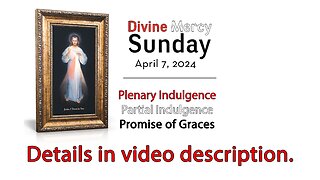Episode 1734: Without Confession (Sacrament of Penance) what would we do?
Now let me speak to you about something I speak about quite a lot which requires a Priest to give us this sacrament. The sacrament of Penance.
Think about it, if you were the devil and you knew that a Priest has an indelible mark on their soul once they receive the sacrament of holy orders, and you knew Christ instituted the priesthood as the means of coming to the faithful (God coming to Man) would you not do all you could to destroy that man! That man is the means of your salvation through the sacraments. This is why I say, “The devil whispered into the ear of Martin Luther,” destroy the priest and you destroy Gods given sacraments.
So this episode focuses on the sacrament of penance, also known as confession or reconciliation, is considered incredibly important. It is one of the seven sacraments recognized by the Catholic Church. The sacrament of penance is viewed as a means of obtaining God's forgiveness for sins committed after baptism and a way to reconcile with the Church community.
But on stop and think about it. Most Novus Ordo Catholic Churches have confession but once a week and usually only for 45 minutes. Take it upon yourself to go to a local church and see how many faithful actually show up for the sacrament. Then go to that same Church and show up for one of the Sunday masses and preferably the larger attended masses and notice how many go up to receive the sacrament. How many of those faiths do you think are in the state of mortal sin? Well speaking for myself I would say it does not take much to be in that state and so weekly or at least monthly reception of the sacrament of penance is necessary. So when they are receiving the holy eucharist in the state of mortal sin do they realize they are receiving a sacrilegious reception of the eucharist? If not, would you think their pastor should be screaming from the Church-Top knowing he has not administered the sacrament of penance to many of those receiving the holy sacrament of the eucharist? NO! Well why not? He’d rather offend Christ the king and would his sacred heart than that of his parishioners. Seems so because it’s happening every Sunday.
Lets hear what saint Paul has to say about that.
1 Corinthians 11:27-29
"So then, whoever eats the bread or drinks the cup of the Lord in an unworthy manner will be guilty of sinning against the body and blood of the Lord. Everyone ought to examine themselves before they eat of the bread and drink from the cup. For those who eat and drink without discerning the body of Christ eat and drink judgment on themselves."
In these verses, Saint Paul is warning the Corinthians about the profound consequences of receiving the Eucharist in an unworthy manner. He highlights the need for self-examination and discernment before partaking in the sacrament. Receiving the Eucharist without proper reverence and understanding of its significance is considered a serious matter, as it involves sinning against the body and blood of Christ.
The Catholic Church has traditionally interpreted this passage as a call to approach the Eucharist with a state of grace, free from unconfessed mortal sins. Therefore, Catholics are required to go to the sacrament of reconciliation (confession) before receiving the Eucharist if they are conscious of having committed grave sins.
This teaching underscores the belief in the real presence of Christ in the Eucharist and the need for a disposition of faith and respect when partaking in this central sacrament of the Christian faith.
Key aspects and beliefs regarding the importance of the sacrament of penance in the traditional Catholic perspective include:
Forgiveness of Sins: Confession is seen as the ordinary means through which Catholics obtain forgiveness for their sins. The act of confessing one's sins to a priest, who acts as a mediator, is believed to convey God's forgiveness.
Restoration of Grace: Through the sacrament of penance, the Catholic Church teaches that the grace lost through sin is restored. This sacrament is seen as a way to repair the relationship between the individual and God.
Sacramental Absolution: In the confessional, the priest provides sacramental absolution, imparting God's forgiveness and reconciling the penitent with God and the Church. This absolution is considered a crucial aspect of the sacrament.
Examination of Conscience: Before receiving the sacrament of penance, Catholics are encouraged to examine their consciences, reflect on their actions, and sincerely repent for their sins. This introspective process is seen as a vital step in the sacramental preparation.
Frequency of Confession: Traditional Catholic teaching encourages regular reception of the sacrament of penance. While the frequency may vary among individuals, it is generally recommended that Catholics go to confession at least once a year, especially during the Lenten season.
Spiritual Healing: Confession is not only about forgiveness but also about spiritual healing. The sacrament is believed to provide the grace necessary to resist sin in the future and to grow in holiness.
Secrecy and Confidentiality: The seal of confession is highly valued in the traditional Catholic perspective. Priests are bound by strict confidentiality and are not allowed to disclose anything revealed in the confessional under any circumstances.
So what should we be doing as faith Catholics? Well if the Priests refuse to safeguard our Lord from having his Body/Blood sacrilegiously received than we will scream from our housetops and start in 2024 to start a revival of the reception of this sacrament regularly because in the end what are we without this sacrament? We are not in the state of sanctifying grace and therefore cannot receiving Christs sanctifying grace because he can look upon a sinful soul. My dear Lord, how could this not be the very most important matter in our lives.
So go out there and convert someone to the sacrament of confession and assure our lord is no longer offended for when we are judged he will say to us “you deny me before man so as not to offend them and so I will refuse you before my father, so you do not offend him” Good Day! Now let here from our Good Father.
-
 28:09
28:09
CatholicReboot
4 months ago $0.08 earnedEpisode 1930: Embracing Faith through Prayer and Penitence
86 -
 21:46
21:46
CatholicReboot
3 months ago $0.03 earnedEpisode 2003: The Eucharist Sacrament of Love and Life
100 -
 3:17
3:17
The Daily Devo by Vince Miller
5 months agoKilling Sin: The Dual Confession | Nehemiah 9:6-31
23 -
 7:43
7:43
The Daily Devo by Vince Miller
5 months agoFrom Confession to Covenant | Nehemiah 9:32-38
416 -
 12:11
12:11
Jesus' Love Letters ... Liebesbriefe
4 months agoAre you ready for the Rapture? Did you leave these Things behind you? ❤️ Love Letter from Jesus
104 -
 24:44
24:44
TotalEmotionalFreedom
3 years agoPaul - How Jesus forgave murder | Bible Study | Lie #1: God Punishes Us Series | Part 12
2872 -
 18:30
18:30
Our Lady's Chapel
3 months ago $0.07 earnedDivine Mercy (2nd SUNDAY of EASTER) - April 7, 2024 - HOMILY
24 -
 48:31
48:31
Sancta Sedes Apostolica - The Holy Apostolic See
5 months agoHow to make a good and valid confession in the true Sacrament of Penance...10 February, 2024 AD
25 -
 53:45
53:45
Sancta Sedes Apostolica - The Holy Apostolic See
4 months agoInvalid Sacrament of Penance of the heretics...The Holy See Canons of ANATHEMA...18 March, 2024 AD
21 -
 9:57
9:57
BlessedBeyondBelief8
3 months agoThank You Lord Jesus for dying on the Cross for my sins so I could receive the Holy Spirit.
77